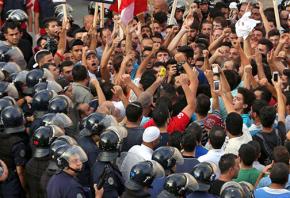Beirut’s hot summer
On Saturday, August 22, thousands of people gathered in central Beirut to protest corruption and political gridlock that has led to towering piles of garbage throughout the city. The following Saturday, thousands more protested.
While the country's political class bickers over who will profit off garbage collection, the protests have quickly mushroomed, drawing together environmental groups, labor, the left and anti-corruption groups. The protests have called for unity among religious and ethnic groups, which is especially crucial considering Lebanon's history of sectarian civil war.
At the first big protest, the government's security forces used water cannons, tear gas and rubber bullets to try to break up the protests, according to the New York Times, but the following weekend, violence was largely averted.
One day after the first major protest, the issued the following statement celebrating the protests and calling for continued unity in the face of government repression and sectarian division.
Let August 22 be the first spark for our uprising against the capitalist sectarian regime
August 23, 2015
IN THE midst of the Arab uprisings in winter of 2011, the Lebanese people engaged actively by protesting for the downfall of the sectarian regime and the establishment of a secular society and state based on social justice and equality, as a giant leap forward towards the ultimate revolutionary change on social, political and economic fronts. Unfortunately, counterrevolutionary forces were quickly mobilized to sabotage this movement and were able to salvage the regime's authority, and through their political parties, succeeded in undermining and coopting the movement.
The beating pulse of demonstrators has returned to the streets as a result of the waste management crisis that has, once again, exposed the true face of the regime with its countless scandals and disasters. These include the blatant theft of the national treasury and society's wealth at large, the sabotage of all democratic processes, deprivation of social and economic rights (as can be seen by the way that the demands of the syndicate of public teachers for higher salaries and the settlement of old salaries have been handled), and new rent laws that, when executed, will lead to the eviction of a huge number of people in Lebanon (approximately 200,000 people) and their displacement to the edge of misery. This, in addition to allowing the banks to channel a great deal of the national income by holding more than 60 percent of the national debt and recouping the interest that ensues from it and thus deepening their hold on society.

In that light, the biggest scandal of all was drowning the country in garbage, dumped in forests, rivers, beaches and the tops of mountains, and in every other place that could be reached by their grime and filth, in preparation of the final privatization agreement on the new garbage deals that would ultimately benefit one bourgeois sectarian lord or another, with complete disregard for this crisis' consequences on the health of all people residing in Lebanon.
In addition, this regime has tried, once again, to silence popular uprisings and all popular masses that took their demands to the streets in the past two days, through brutal repression, as was the case on Saturday, August 22, where security forces proved that their main raison d'etre is not to protect the people, but to protect the interests of the regime from the spark of any kind of popular movement against the regime and its sectarian hold.
We must, therefore, reorganize our ranks and reclaim the streets to build on the momentum of the August 22 protest and achieve the following demands:
1) The immediate and unconditional release of all detainees and an end to arbitrary arrests;
2) Holding accountable all officers and members of the security and military forces that are involved in and responsible for firing bullets, smoke bombs and teargas canisters at protesters, including holding Minister of the Interior Nuhad Al-Mashnouk fully accountable by demanding his resignation;
3) Holding accountable Minister of the Environment Mohammed Al-Mashnouk and demanding his immediate resignation and the removal of the Development and Construction Council's involvement in the waste management file, and returning the authority to municipalities, in particular since the council of ministers has gained this authority through illegal decrees.
4) Lifting the "bank secrecy" for officials responsible for the trash crisis and holding them accountable.
We must continue the popular movement and instigate the formation of popular committees everywhere on the road towards overthrowing the entire sectarian regime and establishing a secular society and state--and continue to call for the dissolution of the Parliament and early elections on the basis of nonsectarian proportional representation, with Lebanon as one jurisdiction. We call for the rigorous trials of all those in positions of authority, from the top of the pyramid to its bottom, who are suspected of theft of the public wealth, and the return of that wealth to the people. We also call for the abolition of the public debt, overthrowing the authority of the banks and nationalizing them, and ensuring the necessary advancements to achieve real social justice. These are the demands that are needed to achieve what the throats of the masses have blared across all the Arab uprisings: overthrowing the regime.
All power and wealth to the people!
Down with this regime!
The Socialist Forum
Beirut, Lebanon
First published at the al-Manshour web site.


